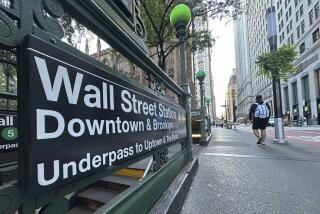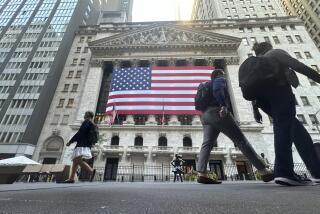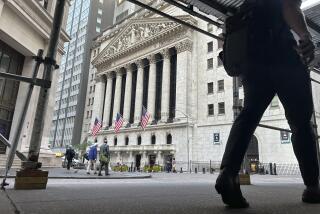Stocks rally on hopes for rescue
- Share via
NEW YORK — The stock market rallied Thursday for the first time this week on signs that lawmakers were close to agreeing on a $700-billion rescue of the financial system, but the market’s gains were limited by a lack of details about the proposed bailout.
The Dow Jones industrial average jumped 196.89 points, or 1.8%, to 11,022.06. The blue-chip indicator was up more than 300 points in the early afternoon as word filtered out from Capitol Hill that lawmakers had settled on the broad contours of a plan. But share prices retreated when it became clear that a final deal was not imminent, and the fate of the proposal remained uncertain Thursday evening.
The Standard & Poor’s 500 index gained 2%, while the Nasdaq composite index rose 1.4%.
But any bailout came too late for Washington Mutual, whose struggling banking operation late Thursday was seized by regulators and sold to JPMorgan Chase. WaMu, the country’s No. 1 thrift and a large mortgage lender, recorded billions in dollars of losses on home loans and in the last 10 days suffered a rush of withdrawals by nervous depositors.
WaMu shares plunged on word of the seizure to 45 cents a share in after-hours trading, down from $1.69 at the end of regular trading. A year ago, the stock was trading above $35.
Most financial stocks surged Thursday on the bailout hopes.
The plan calls for the government to buy loss-ridden mortgage-related debt from financial companies, making it easier for them to raise new capital and resume a normal pattern of lending.
State Street jumped 13%. Bank of New York Mellon climbed 9%. An index of financial firms in the Standard & Poor’s 500 climbed 2.6%.
But the expectation that the government will take an equity interest in any company that participates in the bailout raises questions about how much that would dilute the stakes of existing shareholders, said Douglas Peta, strategist at J. & W. Seligman & Co.
“Any entity that gets out from under troubled assets should be better off,” he said. “That doesn’t necessarily mean equity holders in those entities will be better off.”
In addition, Peta said, a bailout plan won’t directly alleviate the root causes of the crisis -- falling housing prices and banks that are afraid to lend.
Conditions in the credit markets remained troubled, with investors unwilling to take significant risks.
Rates that banks charge each other for short-term loans rose again, indicating that strained financial institutions continue to hoard cash and remain wary of extending credit to borrowers. One such rate, known as one-month Libor, climbed to 3.71% from 3.43% on Wednesday. The rate was 2.49% two weeks ago.
“Turbulence remains extremely high,” said Michael Cloherty, fixed-income strategist at Bank of America Corp. in New York.
The so-called fear trade, however, in which frightened investors head for the safety of Treasury securities, eased a bit.
The yield on the three-month Treasury bill rose but stayed well below normal, reflecting continued heavy demand for the ultra-safe securities. The yield climbed to 0.76% from 0.46% late Wednesday.
But that’s less than half of its 1.61% yield two weeks ago and is barely one-third its 2.2% average over the last year.
The yield on the two-year Treasury note rose to 2.17% from 1.96%.
In a sign of how short-term borrowing is being restrained, issuance of commercial paper for the week that ended Wednesday fell $61 billion, or 3.5%, to $1.7 trillion, according to Federal Reserve figures released Thursday.
Economic news was discouraging as sales of new homes sank 11.5% last month and orders for durable goods such as automobiles and washing machines slipped 4.5%.
Shares of General Electric recovered from an early sell-off and finished up 4.4% at $25.68 after the company mothballed its stock-buyback program and reduced its annual earnings forecast for the second time this year.
GE cited “unprecedented weakness and volatility” in the financial markets that have hampered its GE Capital unit.
--
--
RELATED STORIES
Rescue: GOP revolt stalls bailout plan. Page A1
WaMu fails: JPMorgan buys the bank. Page A1
More to Read
Inside the business of entertainment
The Wide Shot brings you news, analysis and insights on everything from streaming wars to production — and what it all means for the future.
You may occasionally receive promotional content from the Los Angeles Times.










